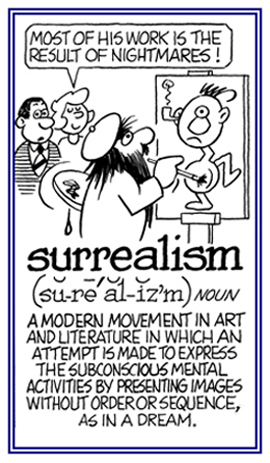super-, supra-, sur-
(Latin: above, over; more than, excessive)
Sur- is a variation of super- developed through the French and shouldn't be confused with another assimilated sur- form that comes from sub- and means: "under, below, beneath".
In some words, super- is amplified to mean: "on top of; higher in rank or position than; superior to; greater in quality, amount, or degree than others of its kind".
2. Anyone who adds a person's name; such as, someone who indicates a circumstance of birth or some characteristic or achievement; an epithet.
2. To be bigger, greater, better, or worse than someone or something else.
3. To be beyond someone's ability to deal with or to understand.
2. Possible of overstepping the range or limit or something: The contents of the German lessons were not surmountable for Jenny to understand because she didn't do her homework thoroughly and German is a tough language to learn!
3. Worthy of exceeding the capacity or powers of something: The only surpassable beauty of any mountain was the resplendence of the Rocky Mountains.
2. Being more than, or in excess of, what is needed or required.
2. Redundant, or an excess of repetitive words, or arguments; verbiage.
2. To print (additional marks, a new address, etc.) over something already printed.
2. To cause people to feel wonder, astonishment, or amazement, as at something not anticipated or expected: David was surprised when he received a birthday call from a neighbor who had moved away years ago.
3. Etymology: "unexpected attack" or "capture", from Middle French surprise, "taking unawares" from the noun use of Old French surprendre, "to overtake"; from sur-, "over" + prendre, "to take"; from Latin prendere, contracted from prehendere "to grasp, to seize".
2. Characterized as an assault, as on an army or a fort, made without warning.
3. Relating to coming upon unexpectedly; detecting in the act; taking unawares.
One of the primary objectives of surrealism is to go beyond the ordinary processes of thinking and logic by existing in a mental world and in dreams.
2. Etymology: from French surréalisme; from Latin sur-, "above, beyond" + réalisme, "realism".Created in 1917 by Guillaume Apollinaire, and then taken over by Andre Breton as the name of the movement he launched in 1924 with Manifeste de Surréalisme.

Go to this Word A Day Revisited Index
so you can see more of Mickey Bach's cartoons.
Related "above, over, beyond the normal, excessive" word units: epi-; hyper-; ultra-, ult-.
Inter-related cross references, directly or indirectly, involving word units meaning "more, plentiful, fullness, excessive, over flowing": copi-; exuber-; hyper-; multi-; opulen-; ple-; pleio-; plethor-; poly-; total-; ultra-; undu-.


